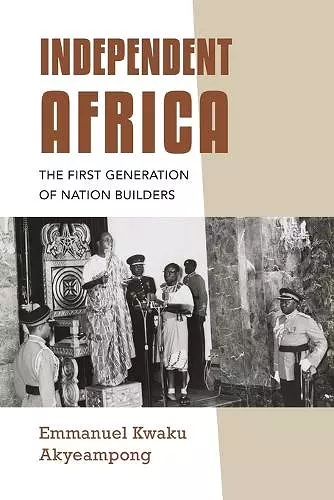Independent Africa
The First Generation of Nation Builders
Emmanuel Kwaku Akyeampong author
Format:Paperback
Publisher:Indiana University Press
Published:5th Sep '23
Should be back in stock very soon

Independent Africa explores Africa's political economy in the first two full decades of independence through the joint projects of nation-building, economic development, and international relations.
Drawing on the political careers of four heads of states: Kwame Nkrumah of Ghana, Ahmed Sékou Touré of Guinea, Léopold Sédar Senghor, and Julius Kambarage Nyerere of Tanzania, Independent Africa engages four major themes: what does it mean to construct an African nation-state and what should an African nation-state look like; how does one grow a tropical economy emerging from European colonialism; how to explore an indigenous model of economic development, a "third way," in the context of a Cold War that had divided the world into two camps; and how to leverage internal resources and external opportunities to diversify agricultural economics and industrialize.
Combining aspects of history, economics, and political science, Independent Africa examines the important connections between the first generation of African leaders, and the shared ideas that informed their endeavors at nation-building and worldmaking.
"In this revealing book, a distinguished historian trains his eyes on the first two decades of Africa's independence. Erudite and judicious to a fault, Emanuel Akyeampong ranges from religion and the arts to economics and politics to weave a fascinating synthesis that does not skimp on the telling detail and the complexities of a variegated continent. Economists and other social scientists interested in the political economy of development will learn much from this book."—Dani Rodrik, Harvard University
"In this fascinating book, distinguished historian Emmanuel Akyeampong offers an insightful, nuanced, and comparative analysis of nation building, economic development, and shifting international relations in select post-independent African countries in the 1960s and 1970s. It brilliantly examines the political and economic thought of the new leaders in the context of the dominant development paradigms of the time, as well as the complex development trajectories of their new nations. An impressive achievement that is a must read for anyone who wishes to understand the political and cultural economies of early postcolonial Africa."—Paul Tiyambe Zeleza, Case Western Reserve University, Ohio, USA
ISBN: 9780253066657
Dimensions: unknown
Weight: unknown
368 pages